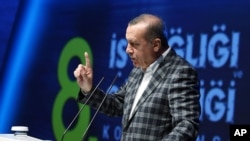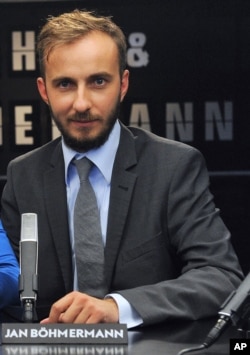A German court is refusing to silence a top media executive who has defended a satirical poem that makes fun of Turkish President Recep Tayyip Erdogan.
The Cologne court Tuesday ruled comments by Axel Springer publishing house CEO Mathias Doepfner in support of a sexually explicit poem ridiculing the Turkish leader are protected by free speech laws.
The development comes amid a long-running campaign by Erdogan to gag satirists, whether they be professional comedians and writers or ordinary people firing off an insulting tweet or other social media comment. Since 2003, Erdogan has instigated more than 2,000 cases against people he deems to have insulted him or his family. Erdogan served as prime minister from 2003 until 2014.
An obsolete German law bars insults against foreign leaders. Earlier this year, Erdogan used the law to make his case against late-night television comic Jan Boehmermann, who had read the poem during a show. The poem mocking Erdogan contained references to sodomy and child pornography.
Boehmermann’s poem was at the root of Tuesday’s legal ruling.
"The defendant has a right to free expression of opinion,” the court decided, rejecting a request by Erdogan for a preliminary injunction, which would have cleared the way for a defamation lawsuit against Doepfner. Doepfner published a letter in Die Welt newspaper in April, saying he “wholeheartedly” endorsed the poem and "laughed out loud," when he heard it.
Ralf Hoecker, the Turkish president’s lawyer, declined comment, as did Erdogan’s office.
A spokesman for the publishing house said, “It’s important to note that Mr. Doepfner wanted to defend the freedom of art and satire in his open letter. That was the reason for his letter.”
‘Long arm of the Turkish state’
Tuesdays’ ruling is unlikely to halt Erdogan’s drive to gag satirists overseas. He has also demanded a satirical song mocking him on a German TV show called extra3 be removed from YouTube.
Additionally, Erdogan is pursuing a doctor for an Internet meme that compares the Turkish leader to the fictional character Gollum, also known as Smeagol, from JRR Tolkien’s Lord of the Rings.
In the Netherlands, Erdogan is pushing for Dutch comedian Hans Teeuwen to be tried for insulting him in a comic sketch. Like Germany, the Netherlands still has an old law against insulting the dignity of a head of state of a friendly country.
Several Dutch lawmakers have complained of the “long arm of the Turkish state.”
In March, the Turkish consulate in Rotterdam issued a notice encouraging Turks living in the Netherlands to report insults against the Turkish president. The notice prompted an outcry from Dutch lawmakers. The embassy subsequently said there had been a misunderstanding with the wording of the request, saying it should have focused on racist statements and hate campaigns against Turks.
“It is part-and-parcel of Erdogan’s bid to intimidate critics in Turkey,” an EU diplomat told VOA. “What is the point of taking them to court if Turks can see elsewhere on the web in Europe, lampoons and satire about him?”
Erdogan argues he has no problem with criticism, just crude insults.
Campaign backfiring
His campaign, however, appears to have backfired. With each move against satirists in Europe, Erdogan risks encouraging more insults, tempting satirists and comics to test his limits and patience, as well as the defamation laws in their countries.
After the April arrest in Turkey of well-known Dutch journalist Ebru Umar for insulting Erdogan on Twitter, the Dutch daily De Telegraaf depicted the Turkish leader as an ape trying to crush free speech in Europe.
Last month, Britain’s Spectator magazine announced “The President Erdogan Offensive Poetry Competition,” offering a $1,500 prize for the filthiest and most insulting depiction of him.
"I’m a free-born British man, and we don’t live under the blasphemy laws of such despots,” wrote magazine columnist Douglas Murray. "So in honor of this fact, I have spent the weekend writing rude limericks about Mr. Erdogan. And I would hereby like to invite all readers to join me in a grand Erdogan limerick competition.”
Erdogan’s anti-satire campaign is adding to the strains of European-Turkish relations as his complaints become entangled in domestic and international politics.
The Boehmermann affair prompted a diplomatic crisis with Germany. German Chancellor Angela Merkel, who was trying to negotiate a migrant and refugee-swap deal with Ankara, drew heavy criticism when her government allowed the prosecution of Boehmermann to proceed. Last week, Boehmermann said Merkel was “fileting me and serving me for tea to a mentally ill despot.” The comic argued he had fallen victim to Berlin’s need to pursue a quick fix for the migration crisis by pursuing a “questionable pact with an unjust regime.”
“Humor versus the German government. I’m curious who will have the last laugh,” he said.
And more broadly, European satirists are asking, "Satire versus Erdogan; who will have the last chuckle?"





